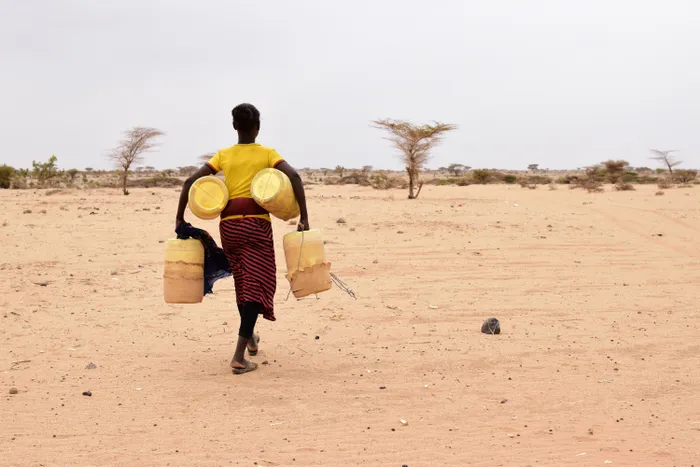Advancing Africa's water security through collaboration

A young girl carries yellow water jerry cans, a symbol of the hours spent searching for water in the Marsabit, Kenya on August 2, 2022.
Image: AFP
Prof. Sipho Seepe
The University of Zululand and Chang’an University had the privilege of hosting the 2025 International Conference on Water Security and Sustainable Development.
The three-day prestigious conference (23rd to 25th May 2025) brought together leading scientists, policymakers, industry experts, and stakeholders from around the world to address one of the most pressing challenges of water security. According to the United Nations, over two billion people live in water-stressed countries.
The effects of climate change have led to a reduction in freshwater availability and climate-induced variability, resulting in an increase in drought in some regions and floods in others.The diverse participant base underscores a global commitment to advancing scientific understanding to formulate practical solutions.
This much was evident from an array of topics that were covered. These ranged from presentations on geothermal systems, climate change impacts, groundwater quality, depletion, and sustainability to antibiotic resistance in mining-affected waters.
The conference also touched on agricultural water management and general water resource management.To this end, the conference provided “a vital platform for sharing cutting-edge research, innovative solutions, and collaborative strategies to enhance water security, improve governance, and promote adaptive management to promote sustainable development.”
With expertise from a myriad of backgrounds from every continent, the conference lived up to its sub-theme of “Collaboration Makes the World Better.” The benefits of such collaboration are multifaceted.
First, environmental challenges such as water scarcity, droughts, and floods, which cut across narrow disciplines, can be resolved by instituting multidisciplinary and transdisciplinary approaches.
Collaboration enables the sharing of data, technologies, and best practices. This is particularly true if one considers that many local solutions have global applicability. Scientific collaboration facilitates knowledge transfer. Fragmented efforts have proven to be costly and inefficient.
Through collaboration, nations are thus able to pool together resources in the form of expertise and technology. Closer to home, the paper "Ensuring the Sustainability of Groundwater Resources in Africa" by Professor Godfred Darko from the Kwame Nkrumah University of Science and Technology in Ghana underscores the importance of scientific collaboration in addressing practical, existential challenges.
Africa, the second-largest continent (30.4 million km²) and second-most populous (1.55 billion in 2025), with a young population, is known for its abundant natural resources. While more focus has been on its surface water systems, less is known that it is also richly endowed with vast groundwater resources.
As a result, Africa is generally presented as a water-scarce continent.Africa’s surface water of 1,170 km³ with over 1,270 dams storing ~20% of available water compares poorly with its groundwater capacity of over 660,000 km³. This translates to more than twenty times the water in lakes. Groundwater provides massive opportunities for sustainable development. African countries use less than 10 per cent of renewable groundwater.
Water security challenges to be managed include pollution from agriculture, industry, domestic sources, weak transboundary management, and governance structures. These challenges can be addressed through the integration of structures such as the African Union and the African Ministers Council on Water. Groundwater is critical for drinking, irrigation, and ecosystems. Its sustainability would require governing structures to ensure enhanced monitoring, pollution management, and research into sustainable practices.
The Xi’an conference was a prelude to the 3rd International Conference on Earth and Environmental Sciences (ICCES-2025) earmarked for the 17th to 20th August 2025 in Durban.
The Durban meeting has already attracted over 600 participants comprising scientists, industry experts, and policymakers. Represented will be more than 70 countries from Asia, Africa, North America, South America, Europe, and Australia.
UNIZULU’s hosting of international conferences is part of a broader strategy of transforming itself as an authentic African university, as opposed to a university in Africa. To this end, it has decidedly branded itself as A Node of African Thought. In partnering with the best players in the world, UNIZULU rejects the colonial and apartheid hierarchisation of higher education that continues to bedevil most of the country’s public discourse.
Such a posture enables the university to chart its path of development. Instead of mimicking and following others, it has chosen to be a pathfinder. To this end, UNIZULU has made enormous progress in inculcating university-wide consciousness of African Thought.
When it comes to development, one cannot be a visitor to China without marvelling at the remarkable strides it has made in terms of its investment in socio-economic development. In forty years, China has reportedly achieved a miraculous feat of lifting about 800 million people out of absolute poverty.
Its investment in both science and technology has propelled it to become the second-largest economy. China has redefined the scale and speed of technological limits. In doing so, it has rewritten the global engineering playbook. There are innumerable lessons for Africa. The most important being that China’s achievements are not despite its challenges but because of them.
For China, every challenge or constraint is viewed as a necessary step or catalyst for growth.
* Professor Sipho P. Seepe is an Higher Education & Strategy Consultant.
** The views expressed do not necessarily reflect the views of IOL, Independent Media or The African.